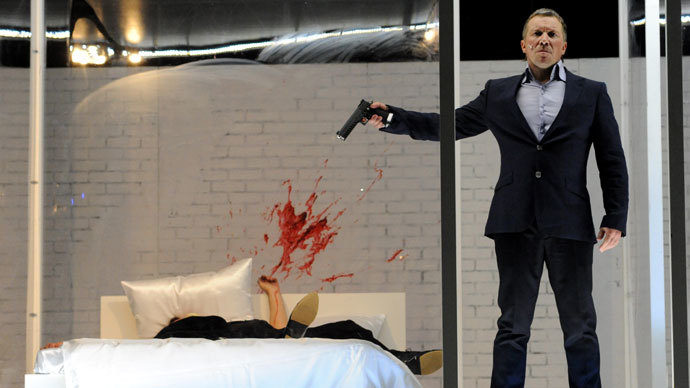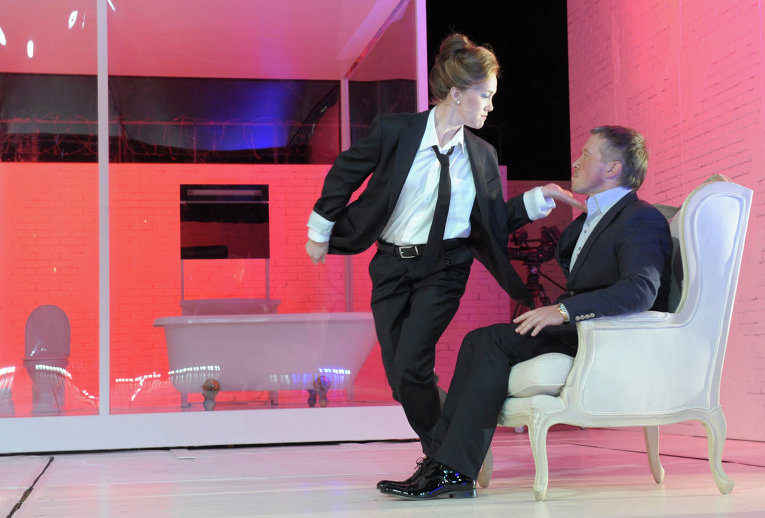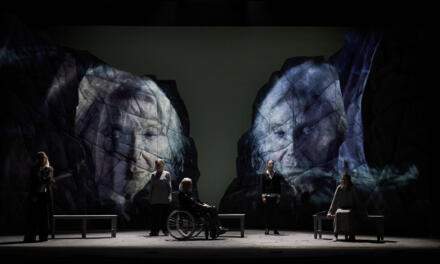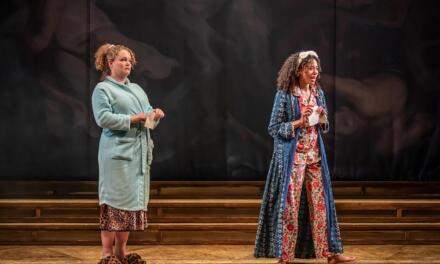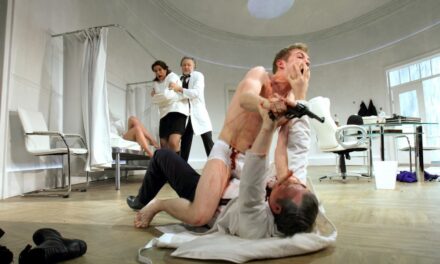June 12 is Russia Day, a day of patriotic celebration that is the rough equivalent of America’s Fourth of July. While much of the capital was given over to flag-waving and fireworks, the Moscow Art Theatre was performing Konstantin Bogomolov’s production of An Ideal Husband: Comedy–less a staging of the Wilde classic than a manic hallucination about contemporary Moscow—to an enthusiastic, standing-room-only crowd, a counterpoint to the official festivities. While Bogomolov, one of Moscow’s enfants-terribles, retains hardly any of Wilde’s text (a favorite complaint of critics), his production offers a searing exploration of the intersections of power, sexuality, and spectacle in Russia.
The production begins with a patriotic pop concert given by Lord (based on the character, Lord Goring), a superstar whose power ballad love song to Russia is accompanied by video projections of the kind of sentimental birch-forested landscapes that have been a mainstay of nationalistic imagery for more than a century. The parody is played so dry that it could easily be mistaken for the official ceremonial concert happening simultaneously a quarter of a mile away on Red Square—and this striking simultaneity of verisimilitude and the absurd continues, unnervingly, throughout the performance. Lord is then joined on stage by his friend Robert Ternov, a government official, who accompanies Lord’s next song on the guitar, at one point playing a solo that evokes a staged masculinity reminiscent of photoshoots of Russian President Vladimir Putin. Following the concert, Ternov is blackmailed by Mrs. Cheverley. Rather than presenting him with evidence that his wealth is the result of a minor abuse of governmental power as in Wilde’s script (hardly a scandal that could justify an evening of theatre in the 21st century), she threatens to release video of him engaged in sexual intercourse with Lord. Eventually, Lord offers to marry her in exchange for giving up her plot, leading to a break with Ternov, and the play closes with the suicide of the star-crossed lovers.
In a postmodern take on Eisenstein’s montage of attractions, the central narrative of the raucous, messy production is constantly interrupted with gags, videos, songs, and fragments of other texts, disrupting its use of melodrama by constantly directing our attention back to contemporary Russia. For example, fragments of Three Sisters are staged throughout the production, but set in posh Moscow cafes with the sisters played as three recently arrived provincial girls fully engaged with the spectacular consumerism on display in such places. In these contemporary sisters’ renditions, the play’s ruminations on the value of work and the future of Russia are hilariously transformed into the vapid musings of a would-be elite. Lord’s wedding (imagined as a “live” television event) is periodically interrupted by actual commercials featuring popular actors from the MAT’s company, hawking wares ranging from cell phones to real estate.
The irreverence directed toward Russian culture is also directed at the Orthodox Church. The production’s most notorious moment occurs at the end of the second act when a nude woman is suspended over the stage as a crucifix. During the early days of the production’s run, this moment prompted protests from religious activists who interrupted performances and called for an inspection of the theatre to determine whether it was in violation of the 2013 law against threatening religious sensibilities, that was passed following the arrest of members of Pussy Riot. In the wake of the coverage garnered by the controversy, the staging was modified—the actress is still suspended over the stage, but now she has her arms crossed over her chest, a concession to legal realities that draws our attention to both the concession itself, and its causes.
In this way the production can be seen as a part of a long tradition in Russo-Soviet theatre of artists operating at the edge of what is legally possible, pragmatically stopping short of messages that might get their productions banned. This is worth keeping in mind when considering the often problematic presentation of homosexuality in the production. It relies heavily on a conceptual alignment between male homosexuality and femininity in its depiction of the affair between Lord and Ternov to unmask the display of hyper-masculinity in Russian political discourse as spectacle. To viewers who detect an allegorical connection between the two characters and Putin and his protégé Dmitrii Medvedev, their sexuality also operates on the level of a schoolyard taunt.
These production choices are mitigated by the fact that An Ideal Husband: Comedy premiered in 2013 on the eve of the passage of a law forbidding among minors the spread of “propaganda” that homosexual relationships are morally equivalent to heterosexual ones. Under this law, the depiction of any gay character on the Russian stage is an act of political courage. Bogomolov’s choices forced conservative critics into contortions as they couched their denunciations of his deviance in terms of professions of their deep admiration for Wilde. One of the few scenes from the original play left intact textually—the one in which Lord Goring’s’ father speaks to him about the importance of getting married—is quite powerful in this production. The expression of heteronormative expectations reminds us of the fate of the author of those words, lending additional poignancy to the original text. And the suicides serve as a stark reminder of the violence (self-inflicted and otherwise) at the core of homophobia. Despite Bogomolov’s focused targeting of Russian culture, I was painfully reminded of the broader reach of the production—and its greater significance—when, after returning home from the theatre, I learned of the Pulse nightclub shooting in Orlando.
An Ideal Husband: Comedy is directed by Konstantin Bogomolov and based on the work of Oscar Wilde. In repertoire at the Moscow Art Theatre, where it premiered on February 10, 2013. This review is based on the June 12, 2016, performance.
This post was written by the author in their personal capacity.The opinions expressed in this article are the author’s own and do not reflect the view of The Theatre Times, their staff or collaborators.
This post was written by Chip Crane.
The views expressed here belong to the author and do not necessarily reflect our views and opinions.

